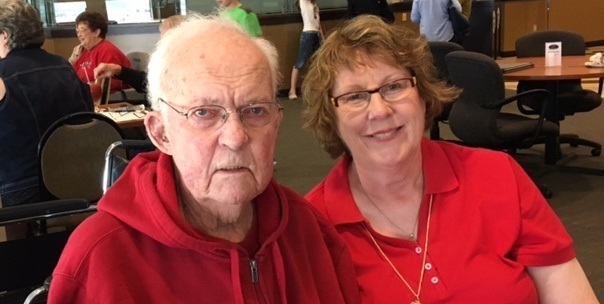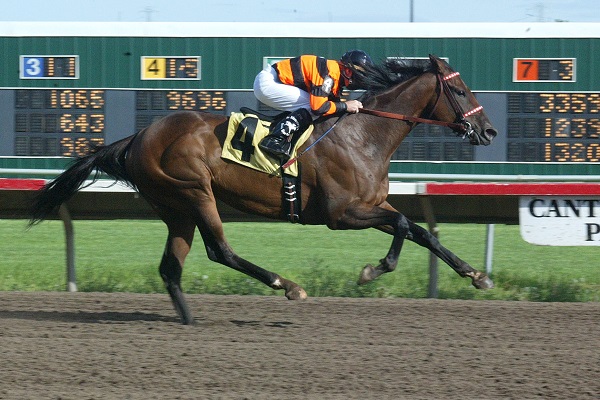
BY JIM WELLS
Trainers recognized something different about Art Eaton whenever they took over horses belonging to him and his wife, Gretchen.
He was not a typical owner. He grew up with horses, and it was obvious. He was not a typical businessman. His word was his bond, a handshake was all that was needed, and that too was clear. Perhaps most telling about the man was his dedication to the horses. He always put them first, always made decisions in their best interest, many times at his own expense.
There was another side to the man not so obvious, except to Gretchen. Art Eaton did not reveal his innermost joy and affection easily. Not when it came to horse racing at any rate. He kept feelings of joy close to the vest, even when his beloved runners won a race.
But Gretchen knew when he was pleased, when he was moved, when maybe even a tear welled up inside him as one of their horses hit the wire first. “His chin would start to quiver,” she said.
Eaton, 87, died October 28 at Abbott Northwestern Hospital after a lifetime devoted to the equine industry. He grew up with horses at Eaton Ranch in Eagan, a dude ranch that also offered sleigh rides and horse rentals to the public, owned quarter horses before horse racing arrived in Minnesota and within a year of the inauguration of Canterbury Downs was racing horses, at first in partnership, later with those he and Gretchen bred, raised and raced out of their farm in Randolph.
Art Eaton was raised in a family well known throughout Apple Valley, Eagan and beyond. At one time, Gretchen was surprised when she shopped in surrounding communities and produced a credit card for the purchase. Store clerks would invariably ask if there was a connection to Eaton Ranch.
Canterbury Park media relations director Jeff Maday referred to the Eatons as the last of their kind in the industry. Horse racing nationwide has changed. The kind of infrastructure people such as the Eatons need is expensive and there is short supply of the labor needed to maintain such an operation. Land for such enterprises is at a premium.
The Eatons’ first trainer Bernell Rhone concurs. “I think those days of the ranches are gone,” he said. Also gone are the people who know horse racing from the ground up. “They understand the game,” said Rhone of the Eatons. “They are good to their horses. They always gave them the benefit of the doubt.”
Mike Biehler trained for the Eatons as well and recalled Art’s knowledge around horses, unlike many owners “He actually knew how to load a horse onto a trailer,” Biehler recalled. “He knew which end went in first. You could tell he knew what he was doing, that he had been around horses.”
When Art Eaton turned a horse over to a trainer, he stepped back, out of the way and let him do his work. He listened and discussed and trusted the men who trained for him and Gretchen.
“He was easy to train for,” said trainer Mac Robertson. “He put his horses before himself, which most people don’t do. It’s hard not to be selfish in this game, and Art was unselfish.”
And he was trustworthy. “His word was always good,” said Robertson “and that’s not the case with most owners.”
Eaton was a land developer, raised in a family that once owned property in Apple Valley, where its first high school now stands. Horse racing was supposed to have been a hobby but it crept swiftly into the lives of Art and Gretchen and took over, commanding every aspect of their lives. It became their passion and all the motivation necessary for heading to the barn each day, sometimes on little sleep but always with dedication and concern for the animals that resided there.
When horses were no longer competitive on the racetrack or simply didn’t fit there, the Eatons either found good homes for them or pasture space at the farm in Randolph.
Art’s dedication to horses had a truly personal cost. He was kicked in the head by a foal at one point and lost his sense of taste and smell. Another time he lost a finger to a horse that reared up on him. Yet, that seemed nothing more to Art Eaton than the price of working with the animals he loved.
The Eatons had been nurturing their horse hobby for some time when Canterbury Downs opened in 1985. The following year they joined a partnership with the Bensons, Dean and Teresa. Soon thereafter, they were buying yearlings, then broodmares, standing stallions and eventually racing their own horses. Their horses, those they raced or bred or both, are part of the legacy of racing in Minnesota _ horses named Now Playing, Hy Society Guy, Dot’s Moment, Silver Me Timbers, Rookie’s Turn, It’s Truly Obvious, Roustabout, Distinctive Turn, Bella Notte and the broodmare that put them on the map _ Alaskan Oil.
For the Eatons, Canterbury Downs and then Canterbury Park became like a second home. “When we were in the barns of whoever was training for us at a given time, it was like that,” Gretchen said. “We met so many people starting with the Bensons, the Sampsons, those who trained for us, the veterinarians, other owners, who have become lifetime friends,” Gretchen said. Their horse, Dot’s Moment, developed a rivalry with a Curt Sampson runner named Samdanya. “Every time I see him he calls me Dot,” Gretchen added. “We were rivals on the racetrack but always friends afterward.”
Eaton’s wake is scheduled on Friday from 3 to 8 p.m., at Lundberg Funeral Home in Cannon Falls. A reviewal will be held on Saturday at St. Pious the Fifth Catholic Church at 9:30 a.m., with a service to follow at 11 a.m.
In 2003 the Eatons were inducted into the Canterbury Park Hall of Fame as champion breeders, a recognition that Art accepted with pride. His fondest wish in racing never took place and Gretchen pointed out a certain irony attached to the timing of her husband’s final services. “He never wished for or talked about winning a Kentucky Derby,” she said. “But he always wished he could have won a Breeders’ Cup race.”
The 2016 Breeders’ Cup races take place on Friday and Saturday at Santa Anita Park.

